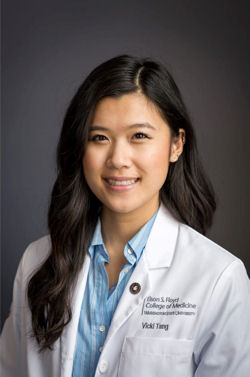By Vicki Tang
“Wait here. I'll be just a moment.” My preceptor rushed out as he was pulled aside by the team's social worker. They scurried off to a separate conference room before I could even finish nodding.
“Oh, he's meeting with a family,” his nurse said, walking by, as she too hurried off to prepare a room for another patient in the busy oncology practice. “I'm sure he won't be long.”
I rubbed in hand sanitizer before returning to my table in my preceptor's office with my notes. There, I busily researched the different types of cancers we'd seen that morning, hoping to impress him when he returned.
However, I couldn't help but feel a little restless.
From the moment I'd arrived in clinic that morning, the whole office had been bustling with nervous unspoken energy. Everyone seemed to know who was coming to visit. I sat there checking the time, watching the seconds melt into minutes and drag on to eternity as I waited patiently.
I looked up and saw my preceptor walk toward me. His posture was slightly slouched, his head tilted down. His steps were slower, more deliberate, as if anything less firmly planted would cause his tightly polished demeanor to crumble. Really, it was his eyes that gave it away. They were swollen, red, and watery. His nose was rubbed raw, his cheeks rosy and flaky with dried tears.
Silence swallowed his deep breaths. “Do you have any questions about anything we saw today?” he finally asked me as he sat down across the table.
How should I respond? Do I assume the role of the curious medical student? Do I show off the clinical pearls I'd been reading about as I waited for him to return?
“No, I don't,” I said cautiously. “How did your meeting go?”
Silence. And then....
I learned that he was young. His family was loved by everyone, truly pillars of their community in the small town nearby. He was popular in school—a football star and straight A student. They were all fighters, they were hopeful, and together they had fought and won the first battle with cancer.
But then the cancer came back. More aggressive. Metastatic.
“His death—it really devastated me,” my preceptor remarked as he stared past my shoulder.
Today, his mother visited the clinic for the first time in 6 months since her son passed away. Her husband still couldn't drive past the hospital. They don't really talk anymore. They don't talk about him.
“I hope she stops by again.”
When we think about hospitals, we might associate them with healing or cure. However, for so many patients and their families, hospitals become places of heartache. I've always wondered, for those patients and families who have experienced the trauma of terminal illness and death, how do they view us? Are we harbingers of death—messengers of a poor prognosis that they never wanted, especially for their child?
And if part of our job description is to be able to deliver difficult news to patients, how should we do it? We are told and trained to be professional yet personable, calm and collected but vulnerable. We tiptoe along a thin line between having real emotions and actually showing those emotions to our patients as if to say, “If they knew that we could feel things, they would never trust our judgment.” But I argue that this approach lacks the ultimate thing that patients may want and need—a human connection—the compassion that becomes the reason to return to the time and place of death 6 months later.
It gave me a sort of relief, knowing that my preceptor cries. It showed me that despite the hardships that come with taking care of the sickest patients, we do not have to let those hardships erode our ability to express emotion. As a student interested in serving patients with cancer in the future, it gives me comfort that even after knowing the tenacity of unrelenting death, we do not have to stop caring about our patients to blunt the pain. Maybe allowing ourselves to feel both the good and the bad will serve to bridge the gap with our patients and their families. We must remind ourselves not to lose sight of the whole spectrum of emotions that help us feel what our patients feel—human.
Maybe I cannot truly empathize or connect as the student I am now, working within the parameters of these structured and rigid clinical experiences. However, I think I'll always remember what it looks like to have touched someone's life so deeply that we can all share our devastation together.
As we finished our morning to the mechanical hum of the automatic hand sanitizer dispenser, I felt the alcohol wicking the last drops of moisture from my hands. I breathed in and felt the evaporating droplets burn my nose, traveling all the way up to sting my eyes. A tear trickled down my face.

Vicki Tang
Elson S. Floyd College of Medicine, Washington State University
Graduating Class of 2022
Back to the May 2022 issue of ACP IMpact

